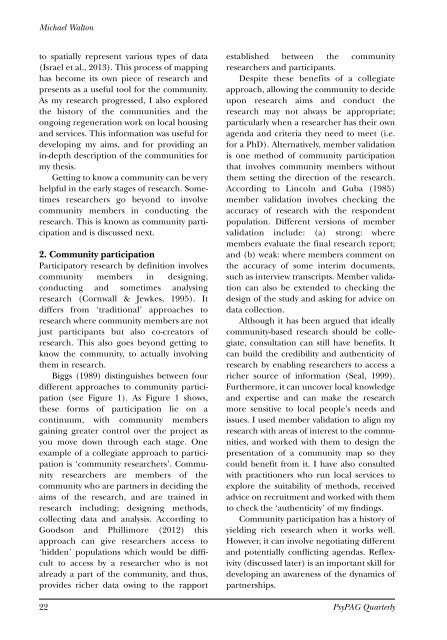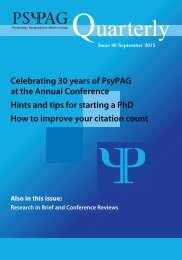Social Psychology Special Issue
XFCu7
XFCu7
You also want an ePaper? Increase the reach of your titles
YUMPU automatically turns print PDFs into web optimized ePapers that Google loves.
Michael Walton<br />
to spatially represent various types of data<br />
(Israel et al., 2013). This process of mapping<br />
has become its own piece of research and<br />
presents as a useful tool for the community.<br />
As my research progressed, I also explored<br />
the history of the communities and the<br />
ongoing regeneration work on local housing<br />
and services. This information was useful for<br />
developing my aims, and for providing an<br />
in-depth description of the communities for<br />
my thesis.<br />
Getting to know a community can be very<br />
helpful in the early stages of research. Sometimes<br />
researchers go beyond to involve<br />
community members in conducting the<br />
research. This is known as community participation<br />
and is discussed next.<br />
2. Community participation<br />
Participatory research by definition involves<br />
community members in designing,<br />
conducting and sometimes analysing<br />
research (Cornwall & Jewkes, 1995). It<br />
differs from ‘traditional’ approaches to<br />
research where community members are not<br />
just participants but also co-creators of<br />
research. This also goes beyond getting to<br />
know the community, to actually involving<br />
them in research.<br />
Biggs (1989) distinguishes between four<br />
different approaches to community participation<br />
(see Figure 1). As Figure 1 shows,<br />
these forms of participation lie on a<br />
continuum, with community members<br />
gaining greater control over the project as<br />
you move down through each stage. One<br />
example of a collegiate approach to participation<br />
is ‘community researchers’. Community<br />
researchers are members of the<br />
community who are partners in deciding the<br />
aims of the research, and are trained in<br />
research including; designing methods,<br />
collecting data and analysis. According to<br />
Goodson and Phillimore (2012) this<br />
approach can give researchers access to<br />
‘hidden’ populations which would be difficult<br />
to access by a researcher who is not<br />
already a part of the community, and thus,<br />
provides richer data owing to the rapport<br />
established between the community<br />
researchers and participants.<br />
Despite these benefits of a collegiate<br />
approach, allowing the community to decide<br />
upon research aims and conduct the<br />
research may not always be appropriate;<br />
particularly when a researcher has their own<br />
agenda and criteria they need to meet (i.e.<br />
for a PhD). Alternatively, member validation<br />
is one method of community participation<br />
that involves community members without<br />
them setting the direction of the research.<br />
According to Lincoln and Guba (1985)<br />
member validation involves checking the<br />
accuracy of research with the respondent<br />
population. Different versions of member<br />
validation include: (a) strong: where<br />
members evaluate the final research report;<br />
and (b) weak: where members comment on<br />
the accuracy of some interim documents,<br />
such as interview transcripts. Member validation<br />
can also be extended to checking the<br />
design of the study and asking for advice on<br />
data collection.<br />
Although it has been argued that ideally<br />
community-based research should be collegiate,<br />
consultation can still have benefits. It<br />
can build the credibility and authenticity of<br />
research by enabling researchers to access a<br />
richer source of information (Seal, 1999).<br />
Furthermore, it can uncover local knowledge<br />
and expertise and can make the research<br />
more sensitive to local people’s needs and<br />
issues. I used member validation to align my<br />
research with areas of interest to the communities,<br />
and worked with them to design the<br />
presentation of a community map so they<br />
could benefit from it. I have also consulted<br />
with practitioners who run local services to<br />
explore the suitability of methods, received<br />
advice on recruitment and worked with them<br />
to check the ‘authenticity’ of my findings.<br />
Community participation has a history of<br />
yielding rich research when it works well.<br />
However, it can involve negotiating different<br />
and potentially conflicting agendas. Reflexivity<br />
(discussed later) is an important skill for<br />
developing an awareness of the dynamics of<br />
partnerships.<br />
22 PsyPAG Quarterly



